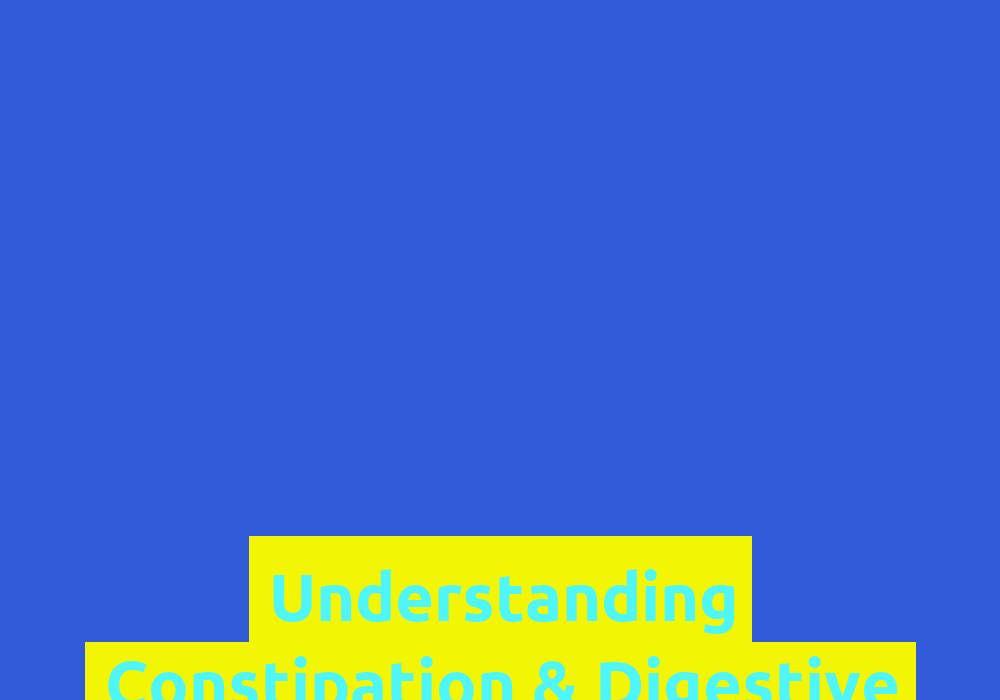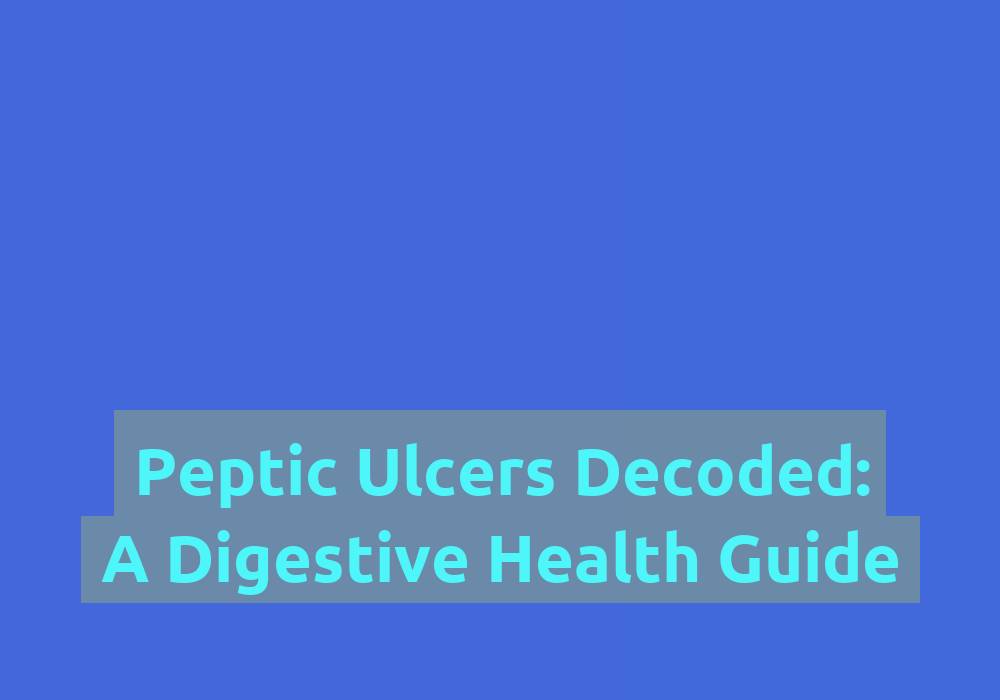Understanding Constipation & Digestive Health

Constipation is a common digestive problem that affects millions of people worldwide. It refers to infrequent bowel movements or difficulty in passing stools, which can lead to discomfort and various other health issues. In this article, we will delve into the causes, symptoms, and potential remedies for constipation while also exploring the importance of maintaining good digestive health.
What is Constipation?
Constipation occurs when there is a disruption in the normal functioning of the digestive system, leading to difficulty in passing stools. It is characterized by fewer than three bowel movements in a week, hard and dry stools, straining during bowel movements, and a sense of incomplete evacuation.
Causes of Constipation
Several factors can contribute to the development of constipation. These include:
-
Low Fiber Intake: A diet lacking in fiber, such as refined grains, processed foods, and low fruit and vegetable consumption, can lead to constipation. Fiber helps add bulk to the stool, making it easier to pass through the intestines.
-
Lack of Fluids: Inadequate hydration can cause the stools to become hard and difficult to pass. It is important to drink enough water throughout the day to maintain proper bowel function.
-
Sedentary Lifestyle: Lack of physical activity and a sedentary lifestyle can slow down the digestive system, leading to constipation. Regular exercise helps stimulate the muscles in the intestines, promoting regular bowel movements.
-
Side Effects of Medications: Certain medications like painkillers, antidepressants, and iron supplements can have constipation as a side effect. If you suspect your medication may be contributing to your constipation, consult with your healthcare provider.
-
Hormonal Imbalances: Fluctuations in hormone levels, particularly during pregnancy and menopause, can affect bowel movements and lead to constipation.
-
Underlying Medical Conditions: Constipation can be a symptom of various medical conditions, including irritable bowel syndrome (IBS), hypothyroidism, diabetes, and colorectal disorders. Consulting a healthcare professional can help identify and address any underlying medical causes.
It is important to address the underlying causes of constipation to effectively manage and prevent its occurrence.
Symptoms of Constipation
Recognizing the symptoms of constipation is essential in addressing the issue promptly. Common symptoms include:
- Infrequent bowel movements (less than three times a week)
- Straining during bowel movements
- Hard and dry stools
- Abdominal pain and discomfort
- Bloating and a feeling of fullness
- Sense of incomplete evacuation
- Fatigue and lethargy
Being aware of these symptoms can help individuals take necessary steps to alleviate constipation and improve their digestive health.
How to Prevent and Relieve Constipation
Thankfully, there are several lifestyle changes and home remedies that can help prevent and relieve constipation. These include:
1. Follow a High-Fiber Diet
Increasing dietary fiber intake is crucial for maintaining regular bowel movements. Incorporate fiber-rich foods such as whole grains, fruits, vegetables, legumes, and nuts into your diet. Aim for at least 25-30 grams of fiber daily.
- Include whole grains like brown rice, whole wheat bread, and oats in your meals.
- Consume a variety of fruits and vegetables, such as apples, berries, broccoli, and spinach.
- Incorporate legumes like lentils, chickpeas, and black beans into your diet.
- Snack on nuts and seeds, such as almonds, chia seeds, and flaxseeds.
2. Stay Hydrated
Adequate hydration is essential for softening the stool and promoting regular bowel movements. Drink plenty of water throughout the day and limit the intake of dehydrating beverages like caffeine and alcohol.
- Aim to drink at least 8 glasses (64 ounces) of water per day.
- Carry a reusable water bottle with you to ensure you stay hydrated on the go.
- Drink herbal teas or infused water for added hydration and flavor.
3. Regular Exercise
Engaging in regular physical activity helps stimulate the muscles in the digestive tract, aiding in the proper movement of waste through the intestines. Aim for at least 30 minutes of exercise most days of the week.
- Incorporate activities like brisk walking, jogging, cycling, or swimming into your routine.
- Try yoga or Pilates, as certain poses can specifically target the digestive system.
- Take short breaks throughout the day to stretch and move around, especially if you have a sedentary job.
4. Establish a Routine
Establishing a regular bowel movement routine can train your body to have consistent and predictable bowel movements. Choose a time of the day when you can relax and take your time in the bathroom.
- Set aside a specific time each day, preferably after a meal, to sit on the toilet for a few minutes.
- Create a comfortable and relaxing environment in your bathroom, such as playing soothing music or lighting a scented candle.
- Avoid rushing or straining during bowel movements, as this can worsen constipation.
5. Avoid Holding It In
Ignoring the urge to have a bowel movement can worsen constipation. Respond promptly to the natural urge and visit the bathroom when needed.
- Listen to your body’s signals and prioritize regular bathroom breaks.
- If you are in a situation where accessing a bathroom may be difficult, plan ahead and use the restroom before leaving.
6. Manage Stress
Chronic stress can disrupt the digestive system and contribute to constipation. Practice stress management techniques like deep breathing exercises, yoga, meditation, or engaging in hobbies to reduce stress levels.
- Take time each day to engage in activities that help you relax and unwind.
- Practice deep breathing exercises to reduce stress and promote relaxation.
- Consider incorporating stress-relieving activities like meditation, mindfulness, or journaling into your daily routine.
7. Over-the-Counter Remedies
If lifestyle changes do not provide relief, over-the-counter remedies such as stool softeners, osmotic laxatives, or bulk-forming agents can be used under the guidance of a healthcare professional.
- Discuss your symptoms with a healthcare professional to determine the most appropriate over-the-counter remedy for your situation.
- Follow the instructions provided on the product packaging and consult a healthcare professional if you have any concerns or questions.
The Importance of Digestive Health
Maintaining good digestive health is integral to overall well-being. A healthy digestive system ensures the proper breakdown, absorption, and elimination of nutrients, while also supporting a strong immune system. Here are a few tips to promote digestive health:
-
Eat a Balanced Diet: Consume a variety of nutrient-rich foods, including fruits, vegetables, whole grains, lean proteins, and healthy fats, to support optimal digestive function.
-
Include a variety of colorful fruits and vegetables in your meals to provide essential vitamins, minerals, and antioxidants.
-
Incorporate lean proteins such as chicken, fish, tofu, or legumes into your diet for a source of amino acids.
-
Choose whole grains like quinoa, brown rice, and whole wheat pasta for added fiber and nutrients.
-
Include healthy fats like avocados, nuts, and olive oil to support the absorption of fat-soluble vitamins.
-
Chew Thoroughly: Properly chewing your food aids in digestion by breaking it down into smaller particles, making it easier for the digestive system to process.
-
Take your time while eating and chew each bite thoroughly before swallowing.
-
Avoid rushing through meals or eating while distracted, as this can lead to inadequate chewing and digestion.
-
Stay Hydrated: Drinking enough water helps soften stools and prevent constipation. Aim for at least 8 glasses of water per day.
-
Carry a water bottle with you throughout the day as a reminder to stay hydrated.
-
Drink water before, during, and after meals to support digestion.
-
If you struggle to drink plain water, infuse it with fresh fruits or herbs for added flavor.
-
Probiotics: Incorporate probiotic-rich foods such as yogurt, kefir, sauerkraut, and kimchi into your diet. Probiotics promote a healthy balance of gut bacteria, aiding in digestion.
-
Include probiotic-rich foods in your meals or snacks, such as a yogurt parfait with added fruits and nuts.
-
Consider taking a high-quality probiotic supplement if you have specific digestive concerns or if recommended by a healthcare professional.
-
Limit Processed Foods: Processed foods are often low in fiber and high in unhealthy fats and additives, which can negatively impact digestion. Opt for whole, unprocessed foods whenever possible.
-
Choose whole fruits and vegetables instead of canned or processed versions.
-
Cook meals from scratch using fresh ingredients to avoid added preservatives and artificial ingredients.
-
Limit your intake of packaged snacks, sugary beverages, and fast food, as they often contain little nutritional value.
In conclusion, understanding constipation and taking steps to promote digestive health is essential for overall well-being. By incorporating fiber-rich foods, staying hydrated, engaging in regular exercise, and managing stress, you can prevent and alleviate constipation while maintaining optimal digestive function. Remember to consult with a healthcare professional if constipation persists or is accompanied by severe symptoms.
FAQ
1. What is constipation?
Constipation refers to infrequent bowel movements or difficulty in passing stools. It is characterized by fewer than three bowel movements in a week, hard and dry stools, straining during bowel movements, and a sense of incomplete evacuation.
2. What are the causes of constipation?
There are several factors that can contribute to constipation, including low fiber intake, lack of fluids, a sedentary lifestyle, side effects of medications, hormonal imbalances, and underlying medical conditions.
3. What are the symptoms of constipation?
Common symptoms of constipation include infrequent bowel movements, straining during bowel movements, hard and dry stools, abdominal pain and discomfort, bloating and a feeling of fullness, a sense of incomplete evacuation, and fatigue and lethargy.
4. How can constipation be prevented and relieved?
To prevent and relieve constipation, you can follow a high-fiber diet, stay hydrated, engage in regular exercise, establish a routine for bowel movements, avoid holding it in, manage stress, and consider over-the-counter remedies if necessary.

